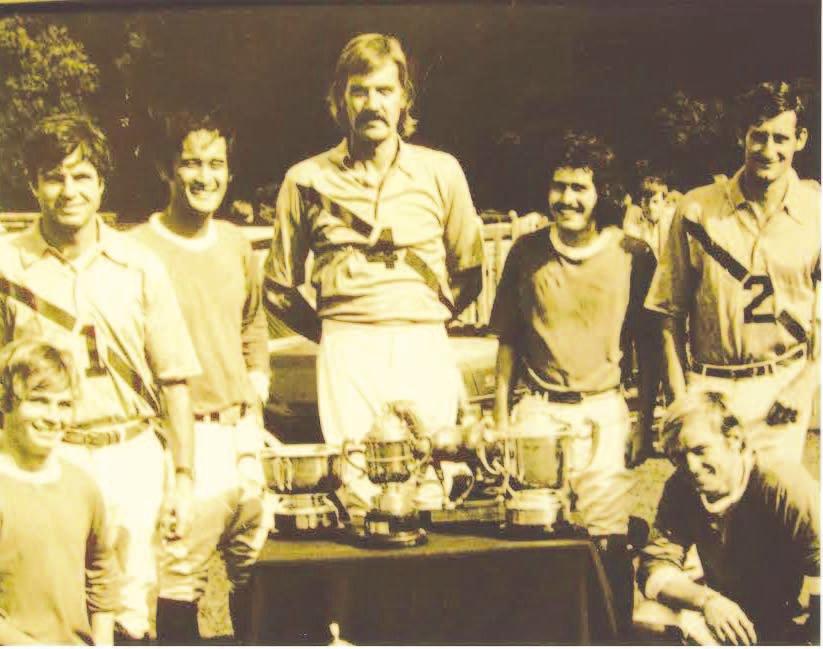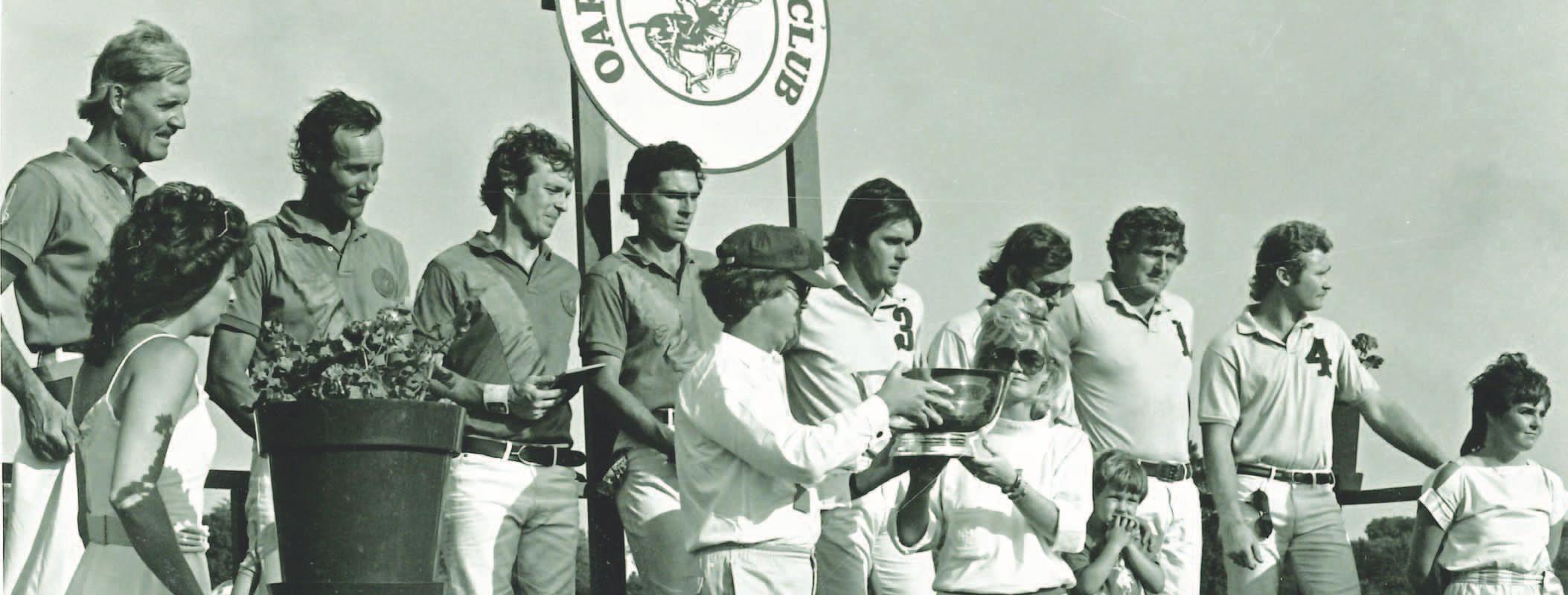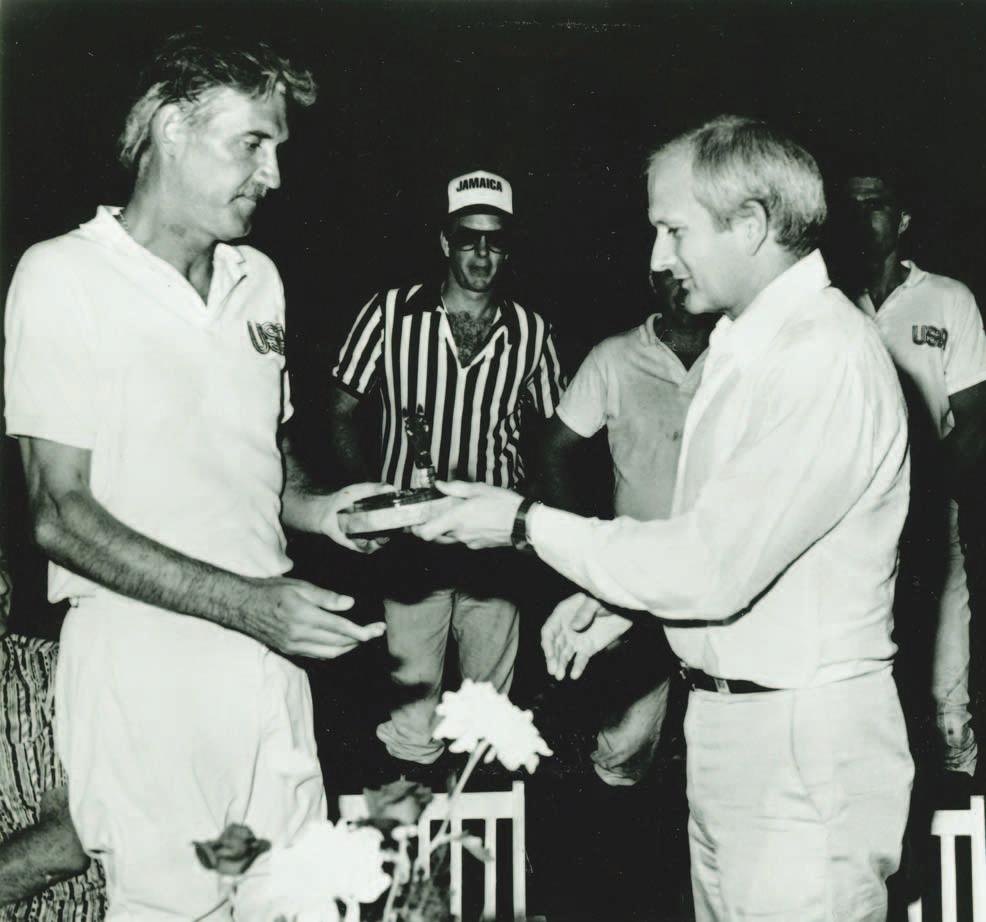
13 minute read
SplittingHairs by Gwen Rizzo
Splitting Hairs
Michael Butler talks polo, producing and politics
By Gwen Rizzo
Michael Butler at Oak Brook in 1988.
To the general public Michael Butler may be best known for bringing the rock musical “Hair” to Broadway. To the polo community, he is known as the tall, slender and colorful character who played a solid game of polo and managed his family’s Oak Brook Polo Club, located in a suburb of Chicago.
While he says polo had the biggest influence in his life, politics and celebrity were woven through it. When producing Hair, the press dubbed him the hippie millionaire. He has been linked to celebrities Candice Bergen, Nati Abascal, Audrey Hepburn and Rock Hudson, among many others. He counts presidents, princes and maharajahs as personal friends. And as a political activist, Abbie Hoffman apparently once threatened to “get” Butler’s polo ponies if he didn’t support his cause.
Though horses and polo were a large part of Michael Butler’s life, the third-generation polo player got off to a rough start with riding. At 7 years old, Butler was riding his pony outside of the barn when they accidentally stepped on a rotten basement door, which they fell through.
“The wood was rotten and there were a lot of nails there, so I got blood poisoning,” he recalled. “First, the doctors wanted to cut off my arm. The family, fortunately, had enough influence in Hinsdale, Illinois, to tell them no, they couldn’t do it.” Instead, tubes were inserted into his right arm, which had to be stationary for three months.
“As a result … they said, now you’ve got to move your arm. So, they gave me a bucket full of window weights …” recalls Butler. “That is one of the first real memories I have of crying to my father … that I couldn’t take it anymore … It hurt so much.”
That trauma didn’t stop him from riding horses. Much of his childhood was spent on the back of a horse. With plenty of room to roam, Butler and his
At one time, there were 12 companies of “Hair” performing around the country.

Michael Butler shares a laugh with Hall-ofFame trainer James Rice.

friends rode all around the thousands of acres, which made up the Oak Brook property, but the injury to his arm prevented him from swinging a polo mallet.
“That was quite upsetting to me because it was practically the only thing that was done or talked about at home,” Butler said.
Instead, Butler started going to horse shows and competing in show jumping. At one point he even considered becoming a professional show jumper. Later, while attending the University of Virginia he took up foxhunting.
Butler didn’t pick up polo until his late 20s. He said, “I walked into the [stable] and father said, ‘Maharaj Prem Singh is not coming to Oak Brook this summer. Why don’t you take his ponies and play polo?’ I couldn’t believe what he said. And he said, ‘You can do it,’ so I did.”
That summer he played on his father’s team with Jackie Murphy and Cecil Smith. Butler said Murphy was about his best friend and Smith and his family were considered part of the Butler family, having played with them in Chicago for years. Butler even referred to him as Uncle Cecil.
So, he felt right at home on the team. But it still wasn’t easy. His scarred right arm was six inches shorter than the left, was locked at the elbow and he was unable to turn the wrist. Somehow, he was able to compensate for it all over the years.
“I had to twist quite a bit,” he admitted. “I definitely felt I could handle my handicap, which was 1. They were talking about moving me to 2, but I had enough influence because I was the governor of the circuit at the time … I felt I could deliver 1 in the back position, but I couldn’t deliver 2.”
Following in his father’s footsteps, Butler was circuit governor for 17 years.
“I had a wonderful time with the USPA. [Bill] Ylvisaker and I did not get along at all. And we had been very close friends,” said Butler. “The biggest disagreement we had was over Ralph Lauren, frankly. I felt, at that time, they should make a deal with Ralph Lauren. He was just brilliant; it wasn’t our business and so forth. But there were some people I thought were taking advantage of the USPA.”
Details of the Coronation Cup matches in England were also a bone of contention.
“One of the deals that was made with the HPA was that the second match, which was medium goal, would only be amateurs and Ylvisaker wanted his son to play,” he said. “He son was not strong enough, so they wanted to put Corky Linfoot in with his son. That broke the thing and we had a terrible fight over that. He was the chairman, so that is what was done.”
Butler also disagreed on the direction polo should go. He said Ylvisaker felt professional players were the key and high-goal polo was the only answer. In contrast, Butler focused most of his attention at Oak

Heath Manning, Ronnie Tongg, Michael Butler, Benji Toda, Tony Devcich and Corky Linfoot in England.

Brook, believing family polo was the key to the sport.
“We had a totally different attitude about the sport. To this day, I still feel 16-goal polo is the best polo to watch,” Butler explained.
Butler managed the Oak Brook club for many years, supplying the ideas while his father supplied the financial backing. He said the club’s location at the center of the country made it an ideal place to host the Open, which was very successful there. However, after hosting it 22 times from 1954 to 1978, USPA officials decided to move it to Retama, Texas.
With the Open gone, Butler concentrated on bringing in visiting teams and sending teams to other clubs. Using his influence with American Airlines at the time, he made a deal to fly teams in and out.
He also traveled to Argentina to purchase horses. In the early days, they would purchase horses from Texas, but later bought them from Eddie Moore in Argentina. Butler said, “Eddy Moore was a terrific person to buy horses from because he would say if you didn’t like them, you could send them back.”
His polo travels took to him to Santa Barbara, where he played with polo greats like Bob Skene, Bill Atkinson and Ronnie Tongg, and eventually England.
“It was Ronnie who influenced me, saying, if you really want to have a good time, let’s go to England, because he had played there before. That is why I moved to England,” explained Butler.
Many of Butler’s closest friends were those that had come to play at Oak Brook when his father and John Cowdray brought the British team to play at Oak Brook and Milwaukee.
The Jaipurs were very close friends with the family and came to Oak Brook to watch the Open in the summers. Michael moved to England in 1970, the same year the Maharaja of Jaipur passed away on the polo field at Cirencester Park. Butler ended up leasing his home at Ascot Park, and took over his ponies and staff, which included horse trainer Judy Balding.
“After being spoiled by James Rice, I wound up being spoiled by Judy Balding,” said Butler. “[I had] the two greatest trainers in each country.”
Butler played with Tony Devcich in England, but when Devcich wanted to go back home to New Zealand, he introduced Butler to Stuart Mackenzie. The 9-goaler ended up playing with Butler for years, including at Oak Brook, before playing with Butler’s sister, Jorie, and her husband Jeffrey Kent’s Abercrombie and Kent team.
Another friend was Lord Patrick Beresford. Butler said Beresford convinced The Queen to let them dust off the Coronation Cup in 1971, which, with the exception of 1953, had sat idle for decades. He and Butler also talked Ronnie Ferguson into taking over management of the Guards Polo Club.
“He had been Prince Charles’ polo manager, but we talked him into it. He is the person who really turned that club upside down and made it happen. He brought in all the commercial sponsorship, including Cartier,” said Butler. “Windsor was a very small operation when I came, but when I left it was really growing …”
Butler spent a lot of time with Prince Philip and even more time with Prince Charles. “Every time Charles came to this country, I would supply him
Michael Butler, playing in Oak Brook in the early 1980s.
Michael Butler, Stuart Mackenzie, Dan Shirey, Michael Dailey, Richard Kimber, Tommy Harris, Fred Stauder and Dale Schwetz in 1984. with ponies,” Butler said.
Butler arranged for Charles to come to Oak Brook with a British team in 1986, the only time he played with a British team in the U.S. as he normally played with American teams when he visited.
“It was quite an event for everybody in Chicago for him to come,” explained Butler. “He was a very good player. He could have been 5 or 6 if he didn’t have his schedule. I wouldn’t have that job for all the tea in China.”
Butler may not have envied Charles’ royal duties, however he did his share of civic duties. After doing work for Jack Kennedy in the Middle East, Bobby Kennedy asked him to get involved in Otto Kerner’s reelection campaign.
“Otto Kerner was the governor of Illinois. He was being opposed by Chuck Percy, the wunderkind running Bell and Howell in Illinois. The odds were 7- 1 that he would beat Otto to be reelected,” said Butler. “I agreed to [help] and wound up running most of Otto’s campaign and winning. … Otto was appointed chairman of the [National Advisory Commission on Civil Disorders]. His [vice] chair was John Lindsay, [then] mayor of New York. Bobby asked me to go with Otto to New York, and so I did.”
Known as the Kerner Commission, it was established by President Lyndon B. Johnson to investigate the causes of the 1967 race riots. The 1968 commission report blamed lack of economic opportunity, failed social service programs, police brutality, racism and the white-oriented media.
Butler was very much against the Vietnam War so he decided to run for U.S. Senate after Otto and then-Chicago Mayor Richard Daley pledged their support for him.
“Frankly, in Illinois, that’s all you needed,” said


Butler. So, he was going to be a senator. But while in New York, he happened to see an ad for “Hair,” the American tribal love rock musical in a newspaper. The ad showed a picture of five Indian braves.
“I thought, my God, the Indians are going to do a show together. My grandfather had instilled in me a great concern for native Americans, which was my major cause until I got involved in the Vietnam War,” said Butler. “So, I got tickets to the first preview of this show, which was at The Public Theater.” He went with friend and author Nancy Friday, whom Butler had worked with. He said it was the strongest anti-war statement he had ever seen, and saw it as a great way to show his constituency what he felt about the Vietnam War.
He asked Roger Stevens, who was head of Kennedy Center, for an introduction to Joe Papp, the head of The Public Theater. He asked Papp if he could take the show to Chicago but Papp declined, saying they run for four or six weeks then move on to something else. But about 10 days after Butler
returned to Oak Brook, Papp called, saying he had a change of heart, they were getting good reviews and asked Butler to be co-producer.
“I said, yes, and I called the governor and mayor and told them I was not going to run for the Senate,” said Butler. “They thought I was absolutely crazy, they really did. However, a couple of years later, Percy, by that time a U.S. senator and chairman of the Foreign Relations Committee, and his wife came to Warfield Hall for the weekend. While there, he said, ‘Michael, you made the best decision of your life when you decided to do ‘Hair’ instead of becoming a senator.”
Butler admits he had never produced anything prior to “Hair” so his initial co-production didn’t succeed and Papp dropped out. Unfazed, Butler took the show on himself. He had the support of Stevens, who he called the best producer on Broadway.
Butler wanted the show to be seen by as many people as possible. The show was doing very well on Broadway, but against the advise of business people, he decided to open it in Boston, Washington, Philadelphia and Chicago.
“At one time, we had 12 companies going across the country at the same time,” said Butler. “In the beginning a lot of the critics were always talking about the music, not talking about the story. But it has a terrific story.
“Almost anybody who was in ‘Hair’ will tell you it changed their life. And of course that starts with me. It changed my life, too. ... There is something so special about it and the effect it has on everybody who is involved in it. That is what gives it strength.”
As much as the production had an effect on his life, Butler admits polo has dominated his life more than anything, almost like a drug would.
“Polo meant more to me than any aspect of my life. Most of my friends are people who are tied to polo. It meant a tremendous amount to me—the spirit and meaning of the game,” he explained.
Butler calls polo the most difficult sport to play, and he enjoys the family-like feel of it—no matter if you are a king or a cowboy, if you play polo you are welcomed almost anywhere. Even after seeing three players killed in polo accidents and having several accidents himself, he was still fascinated with it.
Butler has remained close to many of his former polo teammates. McKenzie, Tongg and Mike Dailey all live in Hawaii, a place Butler visits often. Butler attended a luau in celebration of Murph Dailey’s 100th birthday. “I was fortunate to have my dream team together: Ronnie Tongg, Stuart, Mike Dailey and myself,” he said.

He admits he used to literally live in a plane, however now, at 93, he is reliant on a walker, which limits his travel. That doesn’t keep him from working and he hasn’t seemed to slow down.
He is currently working on another production of “Hair,”—now in its 52nd year—which is scheduled to open in Hollywood in February 2021. The production is scheduled to tour after that.
“It is very pertinent today, maybe is some ways more so than it was in 1968,” Butler remarked. “I have a great crew. They are all like half, to one-third my age, but they are a lot of fun to work with. ... We have a reworked script by the original author. It’s exactly the same story, same songs, but he’s tightened up different aspects of it, which makes it an even better show.”
Butler has a son, Adam, whom he had with his third wife, Loyce Stinson Hand. He calls his son his greatest pleasure. He now lives with him, his daughter-in-law and grandson in Los Angeles, however, he stays involved with the Oak Brook Polo Club and visits once or twice each summer. He has a series of podcasts about his colorful life and is working on another series about Oak Brook polo, to be released in 2022, coinciding with the club’s 100th anniversary. For more information on Michael Butler, go to michaelbutler.com. •
Michael Butler receives a proclamation from the mayor’s office in 1985 during a match between USA and Mexico.










